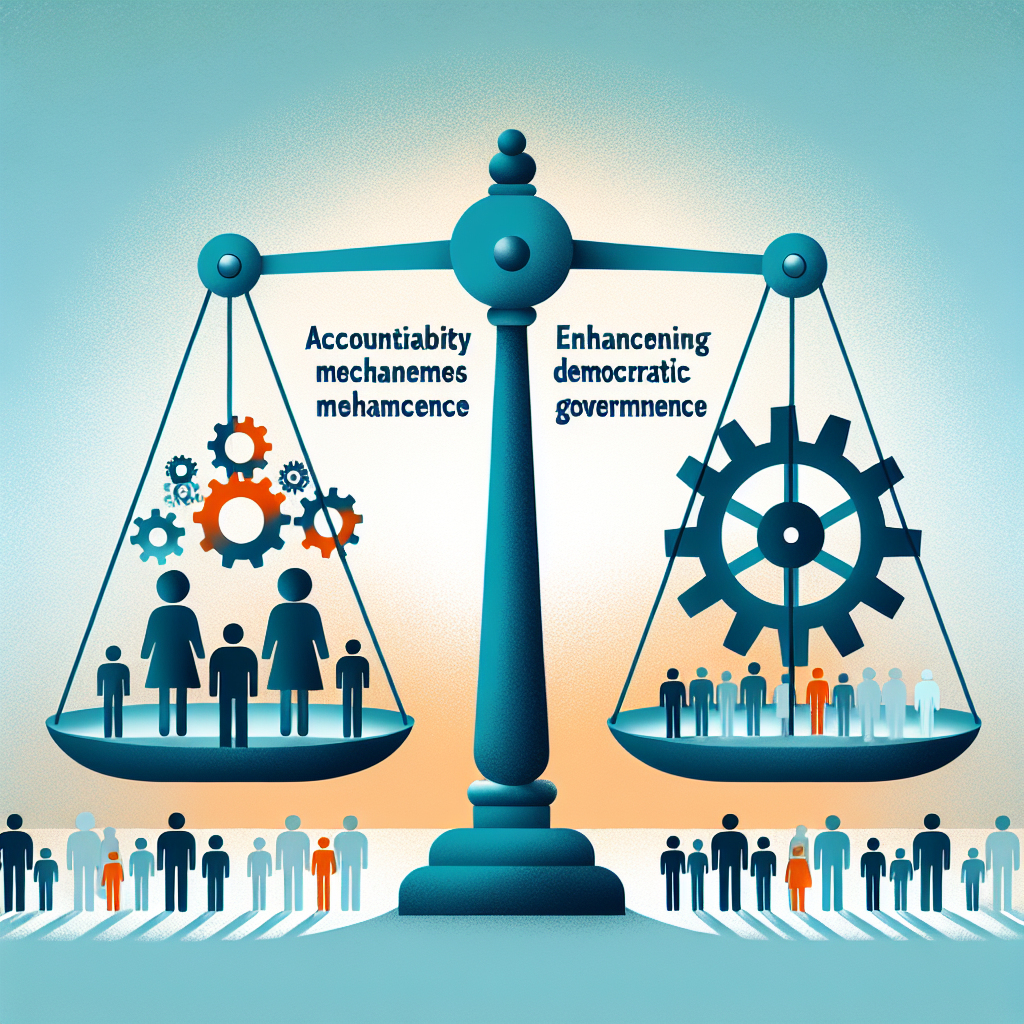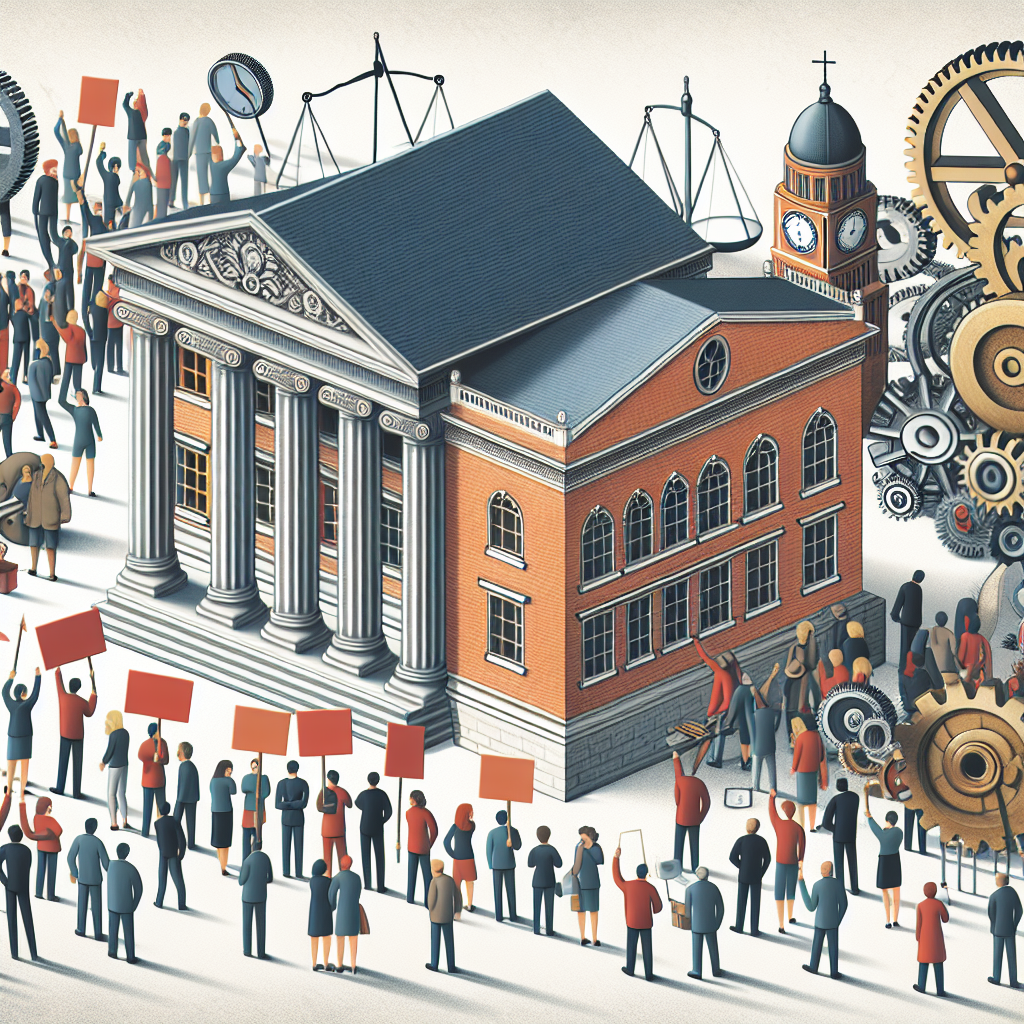
How Accountability Mechanisms Enhance Democratic Governance
In the realm of democratic governance, accountability mechanisms play a crucial role in ensuring that leaders and institutions remain answerable to the people they serve. In 2025, as societal demands evolve and new technologies reshape political landscapes, the importance of robust accountability frameworks has never been more significant. These mechanisms not only promote transparency but also foster trust in governmental systems, ultimately enhancing the overall functioning of democracy. This article delves into how accountability mechanisms enhance democratic governance by exploring key components, their implementation, and their long-term impacts.
Understanding Accountability Mechanisms in Democratic Governance
Accountability mechanisms are tools and processes that hold public officials and institutions responsible for their actions. In democratic systems, these mechanisms are vital in ensuring that leaders act in the public interest and are subject to scrutiny by the governed. Various forms of accountability exist, including political, legal, social, and administrative accountability. Each type plays a unique role in the overarching framework of governance, providing citizens with the ability to demand explanations and seek redress when governance fails to meet expected standards.
In 2025, citizens have become increasingly aware of their rights and responsibilities within a democratic framework. This raise in awareness calls for more rigorous accountability mechanisms to ensure that elected officials remain answerable to their constituents. For instance, innovations in technology have facilitated greater citizen engagement through social media platforms and dedicated polling apps, enhancing political accountability. As a result, traditional methods of accountability are being redefined, allowing individuals to take a more active role in governance, thus reinforcing the democratic process.
The Role of Transparency in Democratic Accountability
Transparency is a cornerstone of effective accountability mechanisms in democratic governance. It involves making government actions and decisions accessible and understandable to the public, thereby enabling informed decision-making. When transparency is prioritized, it mitigates the risks of corruption, nepotism, and abuse of power. In recent years, initiatives such as open data policies have gained traction, allowing citizens to scrutinize governmental spending and policy decisions, thus fostering a culture of accountability.
In 2025, the data revolution has further amplified the demand for transparency in governance. Governments worldwide have adopted technology-driven initiatives aimed at increasing openness. For instance, blockchain technology is being utilized to create tamper-proof records of government transactions and decisions. By making information more accessible, transparency strengthens public trust and encourages civic engagement. When citizens are empowered with information, they are more likely to participate in democratic processes, hold officials accountable, and voice their concerns regarding governance.
Enhancing Citizen Participation through Accountability Mechanisms
A well-functioning democracy relies heavily on active citizen participation, which is facilitated by accountability mechanisms. Mechanisms such as democratic audits, public consultations, and participatory budgeting allow citizens to engage directly with governance processes. These initiatives empower citizens to voice their opinions, provide feedback, and make decisions that affect their communities, thereby reinforcing the relationship between the government and its constituents.
Moreover, technology has played a pivotal role in enhancing citizen participation in the democratic process. In 2025, various platforms enable real-time feedback collection during legislative processes, allowing citizens to express their views instantly. This immediate feedback loop encourages responsiveness from officials, ensuring that the government remains aligned with the interests of its constituents. Additionally, grassroots movements and advocacy groups that utilize digital tools are bringing pressing issues to the forefront, highlighting the need for accountability in their respective contexts.
Not only does active citizen participation enhance the quality of governance, but it also generates a sense of ownership and responsibility among the populace. When citizens see their input reflected in policy decisions, they are more likely to engage in the democratic process consistently. This cyclical interaction between government and citizens fosters trust and reinforces the legitimacy of democratic institutions.
The Impact of Judicial Oversight on Government Accountability
Judicial oversight serves as a critical accountability mechanism within democratic governance. An independent judiciary ensures that laws are applied fairly and consistently, holding government officials accountable for their actions. The judiciary acts as a check on executive and legislative powers, safeguarding citizens’ rights and promoting fairness in governance. In 2025, many countries have witnessed a renewed emphasis on judicial independence as citizens demand greater accountability from their leaders.
Judicial review often serves as a vital pathway for citizens to challenge government decisions that may infringe upon their rights or deviate from the rule of law. Access to legal recourse allows citizens to seek redress for grievances, providing a check on potential abuses of power. This process empowers individuals and diminishes the likelihood of authoritarianism, thereby reinforcing the necessary conditions for democratic governance.
Furthermore, collaborations between civil society, legal experts, and the judiciary can help foster accountability. In 2025, numerous organizations are focused on legal education and awareness, equipping citizens with knowledge about their rights and the judicial system. This creates a more informed citizenry that can effectively navigate the legal landscape to hold their government accountable, especially in times of crisis or political upheaval.
Technology and its Role in Advancing Accountability not Just on Governance
The advent of new technologies has introduced innovative approaches to enhancing accountability mechanisms in governance. Social media and online platforms are crucial in promoting transparency and facilitating public discourse. In 2025, governments are harnessing technological advancements to develop e-governance initiatives aimed at streamlining communication between officials and citizens. For instance, dedicated portals for citizen engagement allow for direct feedback and real-time updates on government projects.
Moreover, the proliferation of data analytics and artificial intelligence provides opportunities to enhance accountability significantly. Governments can analyze vast amounts of data to identify inefficiencies or emerge trends in public service delivery. This data-driven approach enables decision-makers to address systemic issues proactively, ensuring that resources are allocated efficiently and effectively. In turn, this transparency cultivates trust within the democratic framework, encouraging greater citizen involvement.
However, the integration of technology in governance also raises concerns regarding data privacy and surveillance. Therefore, it is essential to implement strict ethical standards and regulations to safeguard citizens’ information. Balancing technological advancements with the fundamental rights of individuals is vital for maintaining public trust and ensuring that accountability mechanisms function effectively within democratic governance.
The Long-term Benefits of Accountability Mechanisms in Strengthening Democracy
The long-term benefits of implementing robust accountability mechanisms in democratic governance cannot be overstated. Ultimately, effective accountability contributes to the legitimacy of democratic institutions, fostering continuous citizen engagement and trust. When citizens believe that their voices matter and that their leaders are answerable, they are more likely to participate actively in democratic processes, leading to a healthier democracy.
Moreover, accountability mechanisms promote sustainable governance by ensuring that decisions are made transparently and responsibly. By creating a culture of accountability, governments can prioritize public interests over personal or political aspirations. This alignment between governance and public welfare ultimately aids in building resilient societies that can thrive amidst challenges.
Lastly, as global dynamics evolve and new issues emerge, accountability mechanisms must adapt to meet the changing needs of citizens. In 2025, the advent of climate change, social justice movements, and emerging technologies necessitates flexibility and responsiveness from governments. By prioritizing accountability, democracies can emerge stronger, more equitable, and prepared to navigate the complexities of a rapidly changing world.
Conclusion
In conclusion, accountability mechanisms are fundamental to enhancing democratic governance. As we move through 2025 and beyond, it is critical for governments to adopt innovative practices that promote transparency, citizen engagement, and judicial oversight. The incorporation of technology can bolster these mechanisms, ensuring that officials remain answerable to their constituents. Ultimately, the strength of democracy lies in its responsiveness to citizen needs and its unwavering commitment to accountability.
FAQs
What are the main types of accountability mechanisms in democratic governance?
There are several types of accountability mechanisms in democratic governance, including political accountability, legal accountability, social accountability, and administrative accountability. Each serves a unique purpose in ensuring that government officials are held responsible for their actions.
How does transparency enhance accountability in governance?
Transparency allows citizens to access information about government actions and decisions, thus empowering them to demand explanations and hold leaders accountable. By reducing opportunities for corruption and promoting openness, transparency reinforces the public’s trust in democratic institutions.
What role does technology play in accountability mechanisms?
Technology plays a transformative role in enhancing accountability mechanisms by facilitating increased transparency, promoting citizen engagement, and enabling data-driven decision-making. E-governance initiatives and analytical tools allow for timely feedback and more effective governance.
How does citizen participation strengthen democracy?
Active citizen participation fosters a sense of ownership and responsibility among the populace. When citizens are involved in governance processes, they are more likely to hold officials accountable, leading to improved trust and legitimacy for democratic institutions.
Why is judicial oversight crucial for accountability in governance?
Judicial oversight serves as a check on the powers of the executive and legislative branches, protecting citizens’ rights and ensuring adherence to the law. An independent judiciary allows individuals to seek redress for grievances and holds officials accountable for their actions.
Democracy versus Autocracy: A Global Perspective
16. Dezember 2025The Impact of Sanctions on Global Trade Dynamics
16. Dezember 2025Geopolitical Tensions in the South China Sea
16. Dezember 2025
Leave a reply Antwort abbrechen
-
The Influence of Trade Unions on Labour Party Policies
12. Dezember 2025 -
The Effect of Environmental Conditions on Athletic Performance
28. November 2025





